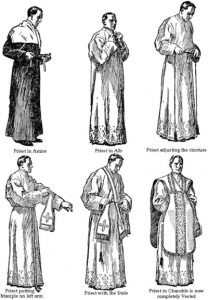 I continue my re-reading, after many years, of Taylor Caldwell’s Grandmother and the Priests, savoring a chapter a day, or at least a chapter at a time with unwelcome days delays.
I continue my re-reading, after many years, of Taylor Caldwell’s Grandmother and the Priests, savoring a chapter a day, or at least a chapter at a time with unwelcome days delays.
Caldwell, not a practicing Catholic, grasped the Catholic worldview and ethos in a way that few writers display.
Today the writer got to me, in the tale of a young priest in a Irish village to which the Devil comes every 20 years to attack the locum tenens.
The young priest, attacked in his mind by a demonic voice during the celebration of Midnight Mass, is in suffering despair. He was only able to get through Mass, wearing the mended, second-hand vestments his mother had bought him for ordination, by sheer autopilot while his mind and heart were being savaged by the Devil’s promptings. Driven by the Enemy to terrible doubts he is about to flee his tiny Irish parish, abandon his priesthood and emigrate to America, where he could hide in anonymity.
And so…
The village was quiet, the men at work, the women shopping for their families, or caring at home for their children. Feverishly, Father Tim ran into his room and wrote an abject (but honest) letter to his Bishop. Then he counted his money. He had five pounds. Was it enough for his passage? Surely not. But he had heard of strong young men working their passage. A savage and disordered uproar had taken his mind, like a storm, through which his thoughts feebly probed and directed him. He threw his few bits of clothing into his bag. He opened his wardrobe door to search the wardrobe. How had his white vestments gotten there? He must have taken them off in the house. He saw his mother’s face, worn, smiling, full of love and faith. He cried out and buried his face in the vestments, and it was as if he had died at last.
If he had not seen those vestments, which rebuked him, which made him remember his mother, who had bought them with such pride and faith and love, he would have gone. He would have been on the train. He would have fled forever, into the hell of exile from God. But the sight of the vestments overcame him. He sat down on the cold floor and held the vestments to his cheek and he wept, and he said over and over, aloud, and loudly, “God have mercy on me, a sinner! God, Almighty Father, give me Your Grace again — ” He held the vestments in his arms as a man holds a life belt, and clung to them. His tears ran down his face and dripped upon his chest and then fell on his hands.
[…]
My throat closed on me.
The connection of his mother and those vestments is strong. But remember also that priests were – and should now – to pray their vesting prayers with each piece as they prepare to say Mass. Each piece underscores a different aspect of priestly identity and aspiration. After many repetitions of these prayers, you cannot help but see vestments differently over time.
Grandmother And The Priests


































This post reminds me of a question I have been meaning to ask. Maybe I should have sent it to “Ask Father Z.” maybe it will get answered here.
Why do priests, in general, not cross their stoles anymore?
Father Z: you got me reading this book on my laptop, a story or two per night. It’s wonderful story-telling, and I read that one 2 nights ago. Frightening!
Do priests still say the vesting prayers? ( and if not, why not?)
Does it matter if the Extraordinary Form vs the Novus Ordo?
That chapter needed sharing. Thanks Father Z.
One of my “conversion novels”, along with “The Cardinal”, “In This House of Brede”, “The Dry Wood”, and “The World, the Flesh and Fr. Smith”.
I used to make vestments, in a small way. It is always deeply humbling to see your work used
at the altar, even if it’s just a repair job. How very much more meaning they must have for the priests who wear them.
Thank you for sharing this, Father.